Where has the year gone, I can’t believe it’s cider pressing season already! It seems only yesterday when it was snowing and I was cursing the fact it was too cold for the cider to finish fermenting.
Last year we started pressing apples on the 3rd September and this year our first pressing of 2018 was the 4th September. So even though we had a cold patch delaying the trees blossoming it hasnt delayed harvest all that much really.
Apples
The first pressing is of Breakwell’s Seedling a Monmouthshire bittersharp cider apple variety originating on Perthyre Farm, Monmouth in the late 1800’s.
They are called bittersharp because the fruit contains both tannins (the bitter drying notes in cider) and acid – hence bitterSHARP.
Breakwell’s Seedling has small, colourful apples (yellow with rosy striping on the sun side) with a delightful strong apple aroma. They are very soft and rot quickly hence have to be processed quickly. The apples press easily yielding a good juice with pleasant flavour.
The resultant cider is light and fruity with a good flavour with some sharp and bitter notes. It is reguarded as a very good Welsh variety and well suited to bottling. When bottled the carbonation lifts the wonderful fruit aroma giving a superior product.
Pressing
We pressed the Breakwell’s seedlings on Tues 4th September. With the help of Keith Jenkins from Cardiff CAMRA. The five bags of fruit yielded 18 gallons of juice which was a good juice yield all in all. The fruit smelled amazing and was very ripe. You could crush the apples between your thumb and forefinger and the pips were all dark brown, a sure sign it’s ready to be pressed.
Fermenting
With this batch of Breakwell’s seedling we are going to do something a bit special.
We have not sulphited the juice yet and are going to leave it to naturally ferment for a week before adding a small does of sulphite to ward off any nasties.
We are leaving the time gap because at the start of fermentation wild apiculate yeasts present in the air spaces of the fruit will ferment the juice to 1-2% abv. They then die off due to the alcohol and be replaced with wild saccharomyces yeasts present on the cider making equipment. The apiculate yeasts are sensitive to sulphite so delaying the addition gives them time to work and create all the interesting minor flavours in the finished product.
Once the saccharmoyces yeasts are fermenting away nicely we are going to cool the fermenting vessel using a beer chiller to just above freezing. This will cause most of the yeast to drop to the bottom of the container as well as any other sediment. We will then rack the cider off the sediment into a new vessel and allow the temperature to increase and the cider to continue fermenting.
Cold Crashing
This process is called cold crashing and it is a controlled way of doing time-honoured cold racking.
Cold racking was performed in the dead of winter by tradtional cider makers. When cider is chilled down to near freezing the yeast stops working and sinks to the bottom of the vessel. If it is then racked not only are you removing most of the yeast from the cider you are also removing a lot of the yeast nutrients. The result is a cider that ferments much more slowly and can naturally stabilise with some residual sugars in it.
We will cold crash and ferment multiple times until the specific gravity reaches 1.012 (medium cider). At 1.012 we will perform a final extended cold crash to remove all the sediment and yeast and rack into kegs for carbonation.
The end result of the work will be a lower alcohol (4%) naturally sweet carbonated cider for the craft market.
It would of course be a lot easier to dillute some cider to 4% and add sugar before carbonation. Or worse, to make a cider out of concentrate to 4% abv like all the commercial cider makers do. But here at Llanblethian Orchards we believe in 100% whole juice, no concentrate cider. So we thought why not go for it and prove that both it can be done and the end result is infinitely superior to mass produced garbage.
We can’t wait to see how it turns out!
If you want to see our press in action we are hosting a cider making demonstration day on Saturday 13th October 10am-5pm.
If you want to make your own cider and have access to apples we also offer an apple pressing service at 50p a gallon resultant juice. Please feel free to contact us for more information.
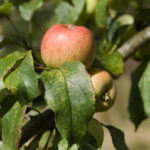
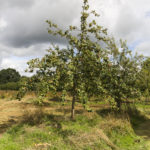
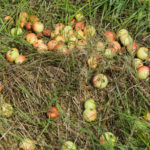
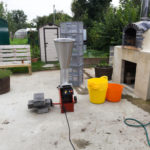
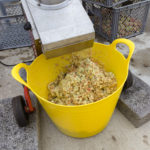
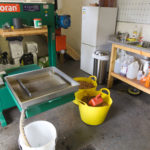
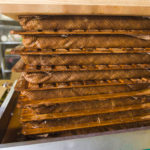
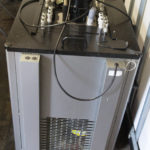
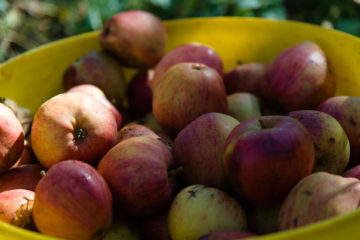
0 Comments